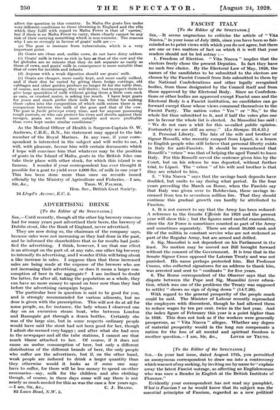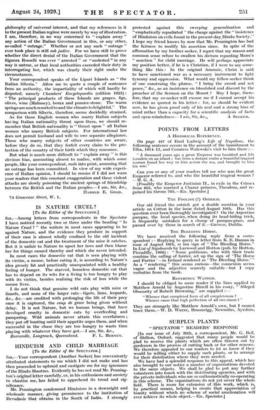[To the Editor of the SPECTATOR.] Sta,—In your last issue,
dated August 17th, you permitted an anonymous correspondent to draw me into a controversy which was not of my seeking, by inviting me by name to" explain away the latest Fascist outrage, as affecting an Englishwoman who was Once a Reader in English at the British Institute of Florence."
Evidently your correspondent has not read my pamphlet, What is Fascism? or he would know that its subject was the essential principles of Fascism, regarded as a new, political
philosophy of universal interest, and that my references in it to the present Italian regime were merely by way of illustration. I am, therefore, in no way concerned to "explain away" any action of the Italian Government in this, or any other, so-called "outrage." Whether or not any such " outrage " ever took place is still sub judice. For we have still to prove whether the direct denial of the Italian Government that the Signora Rosselli was ever " arrested " or " molested " in any way is untrue, or that local authorities exceeded their duty in interrogating her, which was clearly their right under the circumstances.
Your correspondent speaks of the Lipari Islands as the Italian Siberia." Allow me to quote a couple of sentences from an authority, the impartiality of which will hardly be disputed, namely Chambers' Encyclopaedia (edition 1925) : "The principal products of these Islands are grapes, figs, olives, wine (Malmsey), borax and pumice-stone. The warm springs are much resorted to and the climate is delightful." The comparison with Siberia, therefore, seems decidedly strained.
As for those English women who marry Italian subjects having Italian nationality thrust upon them, we should re- member that British nationality is "thrust upon" all Italian women who marry British subjects. For international law does not permit husband and wife to owe separate allegiance. Those who marry subjects of other countries are aware, before they do so, that they forfeit every claim to the pro- tection of the country of their birth which they renounce.
But what is much more difficult to "explain away" is this obvious bias, amounting almost to malice, with which some people, like your correspondent, rush into print, assuming that an outrage has been committed. In view of my wide experi- ence of Italian opinion, I should be remiss if I did not warn your readers that this constant exaggeration and these violent attacks are slowly poisoning the ancient springs of friendship between the British and the Italian peoples.—! am, Sir, &c., IlAnow E. GOAD. 74 Grosvenor Street, W. 1.































 Previous page
Previous page